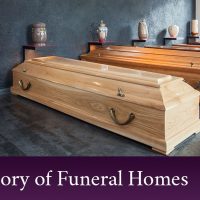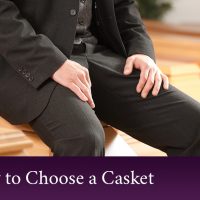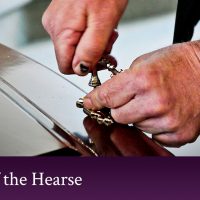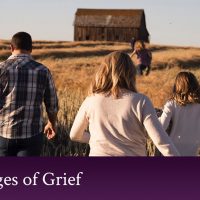When a loved one dies, you often feel overwhelmed, especially if it’s unexpected. Yet in the midst of your emotions and grief, you still have to plan a funeral or a memorial service. There is so much to do, from choosing a casket to picking out a cemetery plot. Yet, one of the most important things you need to do is take care of your loved one’s body. You have many options, from cremation to embalming. Dolan Funeral Home, the best funeral home in Chelmsford, Massachusetts, and serving the greater Lowell and Southern New Hampshire area, reviews your options for preparing your loved one’s body for visitation and burial. Contact us today!
Posts Tagged ‘funeral’

The History of Funeral Homes
Thousands of years ago when someone died, he or she was buried almost immediately. This was mainly due to the smell of decomposition, something people did not understand completely. Over thousands of years, embalming gained speed as humans learned if you removed the internal organs and dried out the body, the body would be preserved. This was mainly for religious reasons as the belief the body rose again in the afterlife was ubiquitous in many cultures.
People often wrapped their dead in shrouds for burial. In ancient Egypt, a sarcophagus was used. Cremation was popular as well. Burial in bogs took place in England and Ireland. Caskets of wood and stone were used by 700 AD by the Celts.
For the last few hundred years, memorials were held in a family home. Women took on the role of caring for the dead. They would prepare the body, and lay it out in the home for visitation, usually in the front parlor, surrounded by their finest possessions. Afterwards, a procession would take place where the body would be transported to the church, and then be buried most likely in a family graveyard or in a local cemetery behind the church. Care for the dead by the family was the norm.
WHEN DID THE CARE OF THE DEAD CHANGE?
The change in caring for the dead came about because of the American Civil War in the 1860s. With so many loved ones dying far from home, embalming became popular so the body could be transported back home without decaying too rapidly.
At this time, the family graveyard was moving towards the more park-like settings of the local cemetery. To help root this practice, the United States established a number of national military cemeteries for members of the armed forces to be buried.
The profession of undertaker was established around this era as well. The term “undertaker” refers to the person who “under took” responsibility for funeral arrangements. Many of the early undertakers were furniture makers because building caskets was a logical extension of their business. For them, undertaking was a side business rather than their primary profession. It did not take long for families to prefer to hand the job of caring for the dead off to others, especially in the midst of their own grief.
MODERN FUNERAL HOMES
From undertakers to funeral directors of today, the process remains much the same; the change has come in the amenities offered for the loved ones left behind. The oldest funeral home was started by Anthony Hay, a cabinet manufacturer and maker of coffins, in 1759 in Williamsburg, Virginia. As demand for coffins grew, the business evolved into a full service funeral home, which is still in operation today.
Most funeral homes are small, family-owned businesses that have been passed down from generation to generation. In the late 1960s, a consolidation of the industry began with large companies acquiring these family funeral homes. Still, family run funeral homes such as Dolan Funeral Home in Chelmsford, MA, remain the best funeral homes for burial services and care.
Dolan Funeral Home in Chelmsford, MA, cares about the loved one left behind. One of our greatest services is our aftercare program where we help you navigate the sometimes complicated process (made more-so when compounded by grief) of the death of a loved one. From wills to funeral bills to just being a shoulder to cry on, Dolan Funeral Home proudly serves the greater Lowell, MA, area. Contact us today!

Funeral and Kids: How to Explain Death to Your Child
It’s a fact that kids’ brains have stages of learning. When you’re a baby on up through age ten or so, your brain is programmed for absorbing as much information as possible. In upper elementary school and throughout middle school, kids’ brains begin to be able to question ideas and form opinions for themselves. In high school, kids’ brains are finally able to argue and process information on par with adults.
Thus, when something complicated in life happens like the death of a loved one (especially if it’s a parent), kids can have a hard time processing death due to the fact they just don’t understand it like we do. And the fact of the matter is they won’t truly understand death until they are old enough.
Dealing with death is especially hard when kids are involved. Dolan Funeral Home in Chelmsford, MA, is a full service, family-run funeral home that has served the needs of the greater Boston communities since 1974. We offer cremation services, traditional burial services, celebration of life services, and pre-arrangement and aftercare services. We understand the impact the death of a loved one can have. Contact us today for the best funeral services in the greater Lowell area.
FUNERALS AND KIDS: HOW TO EXPLAIN DEATH TO YOUR CHILD
- Be forthright. In this traumatic time, the last thing you want is your child to question what you are saying if you lie to him or her. The best way to explain death is openly and honestly. Tell your child what happened (in age-appropriate language especially if it was an accidental death with a lot of blood involved). Answer all of your child’s questions honestly. Try to convey the fact death is permanent — at least in a bodily form. If you practice a religion, explain your religious beliefs about death to your child, again, in age-appropriate language.
- Don’t overwhelm your child. Too much information can only confuse your child. Answer your child’s questions simply. Don’t add too much detail unless prompted.
- Don’t pressure your child. Children will process emotions differently. Some will internalize death and not want to talk about it. Others won’t stop asking questions. Allow your child to deal with the emotions of death in his or her own way. Don’t pepper him or her with questions. Respect where your child is right now.
- Allow your child to attend the funeral. Your child will need to see your loved one at the funeral. For some, this is when it becomes real to them. Being able to see your loved one and touch him or her and say good-bye is crucial to healing.
- Reassure your child at every turn. Tell your child he or she will be alright. That you are still there for him or her. That life will continue — just differently. Be specific about what will change. For instance, if grandma used to pick your child up from school, tell him or her who will be filling that role instead. It’s crucial your child is reassured that he or she will be okay.
- Remember the person. One of the best ways to process death is to remember the good times you had with that person. When you feel your child is ready, review old photos and discuss the good times you had. Make a scrapbook dedicated to your loved one. Visit the gravesite if a traditional burial was chosen. Bring flowers. Celebrate the person and the impact her or she had.
- Be prepared for a gamut of emotions to come and go (like they do with you). Let your child know it’s okay to cry, to be angry, and to not understand. These feelings are natural and are part of the grieving process. Be there for your child through these ups and downs.
These same tips apply to the death of pets as well. In fact, the death of a pet is the most likely occasion your child will first experience death. Expect the same emotional rollercoaster, even if it’s just a goldfish. In fact, the death of a pet can often be more meaningful and more impactful since the pet lived in your home 24/7 with your child as opposed to grandma who only visited.
Death is a part of life — albeit unpleasant — that we all have to deal with. Children, however, have a much different perspective than we adults do. Their worlds are so much smaller than ours and only entail sometimes a few people when they are little and then expanding to school. Still, the world for them is small. Death for them is unimaginable. And for older kids, hubris and the idea nothing can happen to them interfere with the concept.
Dolan Funeral Home in Chelmsford, MA, understands the hole that is left when a loved one dies. Our mission is to make the funeral planning process as smooth as possible, so you can grieve. We offer pre-planning or pre-arrangement services, which is planning your funeral in advance, in order to settle a lot of the details ahead of time. We have an amazing aftercare program, which offers guidance on the logistics of dealing with a loved one’s death. And of course we offer both traditional burial services as well as cremation services for the immediate needs death brings.
As the best funeral home in Chelmsford, MA, servicing greater Lowell and Southern New Hampshire, including Chelmsford, N. Chelmsford, Tyngsboro, Westford, Dunstable, Dracut, Lowell, MA, and Hudson, NH, Dolan Funeral Home cares for your loved one in death like you cared for your loved one in life. Contact us today!
Dolan Funeral Home in Chelmsford, MA, is a state-of-the-art funeral home. One of the largest funeral homes near Lowell, MA, Dolan Funeral home offers traditional funeral services, cremation services, embalming services, catered food and drink services, and aftercare support. We are dedicated to celebrating and honoring your loved one’s life from the moment they pass till the transportation to the cemetery for burial and after. Dolan Funeral Home caters to all funeral service needs.
That’s a lot Dolan Funeral Home offers. But funeral homes didn’t always exist, and it was a slow process to build up such a repertoire of services. In fact, it wasn’t until the 20th century that funeral homes as we know them today came into existence.

How to Choose a Casket
Death, despite being a part of life, is not easy to deal with. Depending on your relationship with the deceased, dealing with death can be devastating. On top of mourning, you now have to deal with all the logistics that go along with the death of a loved one — namely funeral arrangements. From picking out a funeral home to choosing a date for visitation to picking out a cemetery, the decisions are endless.
Dolan Funeral Home is here to help. We are an all-inclusive funeral home service, offering pre-arrangement services, help with the financial aspects of a death, and all the services for the actual burial, including either embalming or cremation, casket selection, visitation and burial services. We also offer after-care services, helping you tie up all the loose ends after the death of a loved one, as well as advice on the will. Dolan Funeral Home serves the greater Lowell and Southern New Hampshire areas, including Chelmsford, North Chelmsford, Tyngsboro, Westford, Dunstable, Dracut, Lowell, and Hudson with funeral, burial, and cremation needs. Contact us today.
HOW TO PICK OUT A CASKET
Caskets have come along way since the sarcophagus of ancient Egypt. No longer are we in the days where four boards nailed together is in style (or what the majority of the population wants their loved one’s last remains to rest forever in). Modern caskets are built to withstand the harsh elements of the earth and allow your loved one to truly rest in peace. Below are tips for picking out a casket.
CASKET OR COFFIN?
While the word casket is often used interchangeably with coffin, there is an important difference between the two terms: a coffin is hexagonal or octagonal, while the casket is rectangular. In addition, a casket is different in that it usually has a split lid in order to view the body, while a coffin does not. Different parts of the world prefer one or the other. In the United States, we prefer caskets since saying good-bye to our loved ones visually is important.
MATERIALS A CASKET IS MADE FROM
- Wood caskets. Still a popular material to make a casket from, wood is a good choice for a solid casket. A variety of woods is used such as hard woods (oak, mahogany, and cherry) as well as the lighter woods (birch, maple, and pine).
- Metal caskets. Three types of metal are the most popular choice for caskets: standard steel, stainless steel, and copper or bronze. Standard steel is the least expensive type of steel caskets available, while stainless steel is more expensive because it’s more durable. Both come in different gauges to suit your needs. As you might have guessed, copper and bronze are the most expensive since they are high-quality metals. Copper and bronze caskets are extremely resistant to rust unlike steel. That being said, both copper and bronze caskets will still oxidize and break down in a manner similar to rusting, but it will take a long longer before this happens. These two types of caskets are measured by weight, which also ups the price.
- Eco-friendly. Materials that are environmentally friendly are increasing in popularity as consumers are more conscious of preserving our resources for the next generation. Wicker caskets made from bamboo, willow, or seagrass are now available. Despite how flimsy they sound, cardboard caskets are surprisingly well-made and are easily customizable with a digitally-printed design.
- While not technically a casket, Dolan Funeral Home thinks burial shrouds are worth mentioning as an alternative to expensive traditional casket materials. Made from wool, cotton, linen, and silk, burial shrouds harken back to ancient times and are wonderful for their simplicity. They are also surprisingly peaceful and elegant.
- If your heart is set on a traditional wood coffin, a coffin or casket made from sustainably sourced wood is still environmentally friendly. The wood is typically 80 percent waste wood (wood combined from other pieces of wood that are too small to make much of) and 20 percent FSC-certified wood (wood that is certified for being harvested in a sustainable manner by the Forest Stewardship Council). Add a biodegradable cotton lining for complete recycled materials.
CASKETS FOR CREMATIONS
Yes, this sounds paradoxical, but if you opt for cremation, you may still want a casket or coffin to hold your loved one in. Known as a cremation casket, these caskets are made specifically to be cremated along with your loved one after the service. Cremation caskets come in a variety of materials as well such as wood, cardboard, or fiberboard.
Another option is a rental casket. This choice is not as far-reaching as you think. Rental caskets are rented usually from the funeral home for the sole purpose of having a nice casket for your loved one during the funeral service. Rental caskets are crafted to include an insert for the cremation casket, so the cremation casket can be placed inside the ceremonial casket for the service. After the service, the cremation container would be removed for cremation. One last alternative is to use a rental casket for the funeral service just to hold your loved one, and then you would have your loved one removed, cremated, and placed in a different holding container such as an urn.
GASKET OR NON-GASKET?
Metal caskets come with the option of having a gasket or not. A gasket is a special seal designed to keep out the elements and preserve your loved one longer. As most of us know, the natural process of decomposition can only be delayed, not stopped permanently as we’ve all seen from the Egyptian mummies. A gasketed casket is also called a protective casket, which adds to the overall cost of your casket.
SELECTING A COFFIN
Now that you have the different types and varieties of caskets and coffins in mind, you’re ready to select your coffin. Federal law dictates that the funeral director must show you a list of caskets available before you see the actual caskets. This stems from the past where funeral directors would sell the most expensive coffins to customers without offering them options.
At Dolan Funeral Home, we have a showroom with a wide variety of wood and metal caskets for you to view in person. We also have several casket catalogs for you to peruse and order from. It is permissible for the family to make a casket, provided it is delivered to the funeral home and a waiver of liability is signed.
FINAL TIPS FOR PURCHASING A CASKET
Caskets can be one of the most expensive parts of a funeral home service and funeral home expenses overall. You’ll want to take your time and look over your options. Don’t choose the first one you come across. Inquire of the price and all your options, and ask the funeral director if you have questions. Your loved one deserves the best, and Dolan Funeral Home in Chelmsford is dedicated to helping you through the funeral home service process from start to finish. We’re open every day of the year to serve your needs. As a full service, family-owned funeral home, we understand the grief process, and we’re here to help with all the logistics during this trying time. Contact us today for all your planning a funeral needs!

Dealing with Conflicts over Funeral Arrangements
The grief of death is real. It takes months to “get over” a death although odds are you’ll never get over the death of a cherished member of the family. Luckily, he or she will forever live on in your hearts and in your memories.
That being said, the immediate aftermath of a death is challenging, especially if there are disagreements in the family over funeral arrangements. Dolan Funeral Home, the best funeral home in the greater Lowell, MA, area, understands how hard it is to agree on funeral arrangements. After all, the decisions you make now are final, and thus, important. Below, we’ll offer up tips on how to deal with family conflicts that might arise during the funeral planning process.
TIPS FOR DEALING WITH CONFLICTS OVER FUNERAL DECISIONS
- Put personal feelings aside. Families are inherently messy because people are messy. We all fall, but it’s how we pick ourselves up that matters. When dealing with conflicts, try to put your personal feelings about the other person aside and remember to put the memory of your loved one first.
- Try to abide by the loved one’s wishes. This is fairly easy to do when there is a will present that states your loved one’s last desires for his or her funeral. In fact this is preferred, and Dolan Funeral Home offers pre-arrangement services — which goes a long way in avoiding conflicts of this type. We strongly recommend putting your final wishes in writing as well so there are no questions once the time comes. However, in lieu of a formal written agreement, disagreements will probably arise, especially in blended families or divorce situations. And going off “Aunt Mary said this to me on her death bed” usually doesn’t solve the problem. Again, try to think what your deceased loved one would want.
- Employ a mediator. If all else fails, a third-party can intervene and be a mediator. This should be someone trustworthy but without a conflict of interest towards one party or the other. A clergyman or family friend is a good choice. A voice of calm and reason is sometimes all that is needed amidst all the swirling emotions a death brings.
- Compromise. The greatest decisions ever made were the results of compromise as our Founding Fathers understood when they made five key compromises for the Constitution to become a reality. Listen to everyone’s concerns and desires and allow everyone to be heard. Then decide what is most important for you, and let the others go. Another way to put this is pick your battles.
- Remember everyone is stressed. People handle stress differently and when combined with shock, grief, and loss, anything can happen. Come close up. Others lash out. At the end of the day, you love your family. Forgive one another for what happens during this difficult time.
Religious differences. This is the most difficult conflict to mediate and compromise on as each person holds his or her religion quite dear. In this situation, try to think what the deceased loved one would want and ask yourself how much it actually means to you versus your other relative. - Let it go. At the end of the day, the memories you hold close of your loved one is what matters most. While funeral arrangements are important, they are not worth ruining relationships over. Your deceased loved one would want love to be the guiding light during this difficult time not animosity and strife.
So many people avoid talking about their impending death because we as humans are in denial that it will ever happen. This is the heart of the matter and of the conflicts. We all will die and being open and honest about it before your loved one passes is the best way to avoid conflicts during the midst of grief and create a loving memorial service — not one tainted with acrimony and hurt feelings.
Dolan Funeral Home understands the hardships faced by surviving family members in the wake of a loved one’s death. We are here to offer advice, guidance, and support for all of your funeral home needs. Serving the Chelmsford, MA, area as well as southern New Hampshire (Chelmsford, North Chelmsford, Tyngsboro, Westford, Dunstable, Dracut, Lowell, and Hudson), Dolan Funeral Home is here for you. Contact us today for all your funeral arrangement needs!

How to Choose a Final Resting Place
When a loved one passes, we do our best to honor his or her final wishes. We want the funeral service to be perfect, the flowers to scent the air like it’s spring, and the weather to be pleasant and comforting. In addition, we want the place where our loved one’s remains will rest for eternity to be as perfect as possible. Choosing a final resting place — be it a cemetery, a burial container, or a mountaintop — can be challenging.
Dolan Funeral Home, a full-service funeral home near Lowell, MA, offers tips for those struggling to choose a final resting place for their deceased loved one.
TIPS FOR CHOOSING A FINAL RESTING PLACE FOR YOUR LOVED ONE
Did your loved one express a desire to be buried somewhere? If so, then you’ll want to honor those wishes, even if cumbersome or out of the way. For instance, in the case of someone being married twice, he or she may wish to be cremated and the ashes spread between both locations next to the beloved spouses.
However, if your loved one did not talk about where he or she wished to spend eternity and/or expressly left it up to you, then here are some points to consider:
- Did your loved one have a favorite spot? Did he or she love the beach or climb mountains or love a secluded woods right down the road?
- We all know when a loved one dies, he or she lives on in your heart. However, if you’re getting your loved one cremated, you don’t have to bury the ashes all in one spot. you can keep a portion of the ashes for a special locket, so your loved one will always be close to your heart.
If considering a traditional burial, consider which cemetery would best fit with your loved one. Was he or she religious? Then perhaps a cemetery particular to that religion would be suitable. Did he or she like a particular cemetery over another in your town? Is one cemetery more shaded than another? When choosing a cemetery for a final resting place, you’ll want to find out the burial rules as well. Some restrict what kind of monument you can erect and what type of flowers you can leave or decorations you may have. If this is important to you, make sure you ask before you choose the final resting place. - Consider an urn if you are considering cremation for your loved one. Your loved one can occupy a cherished spot in your home, and with so many options in urn designs, many will not even know the urn on your mantle holds your loved one’s remains. Another reason you may want to consider an urn is if you believe you may be moving from your present location, and you want your loved one to go with you until you’re settled.
- Is there a family history to consider? Are all of your relatives from years past buried in the same location? If not, would you want to start a family burial plot, so you can be buried next to your loved one as well?
- Consider a living memorial. Was your loved one environmentally-conscious? Would your loved one want to be buried under a tree?
- Experts believe having a place of remembrance to physically go to can help bring closure and move through their grief. Choose a place you will want to visit — a place of beauty and quiet solitude, and a place where you’ll feel connected to that person. Final resting places for your loved one are endless. From traditional burial plots in a cemetery and urns to garden stones and one-of-a-kind jewelry pieces or scattering of the ashes, the choice can be overwhelming, especially in the grief process.
Dolan Funeral Home is here to help with all your funeral home needs. We offer a traditional service or a celebration of life. We will cater these memorial events for you as well, and we have a list of recommended caterers for your convenience. We have a wide selection of caskets, urns, and burial vaults. We offer cremation services as well as embalming. We can transport your loved one’s casket to your chosen final resting place. Finally, we offer aftercare support to help you navigate the sometimes complicated legalities a death brings.
Dolan Funeral Home is a family-run funeral home that has been serving the greater Boston communities since 1974. Our experience and compassion makes us the best funeral home. Contact us today for all of your burial service needs!

How to Purchase a Cemetery Plot
There are many reasons to purchase a burial plot in a cemetery ahead of time.
- Less expensive. When you purchase a burial plot in advance, you’ll most likely save money. Your family won’t be rushed into a decision after your death, and you can take your time shopping around for options. Furthermore, a grieving family is the perfect candidate for others to take advantage of — and owners of cemeteries know this. Rushing a decision can result in your family spending thousands of dollars more than they should.
- You choose. When you choose where you want to be buried for eternity, you’re in control. If you want to be under a big shady tree or near a stream, you get to pick.
- Ensuring you’re next to loved ones. Buying multiple cemetery plots is usually cheaper as you usually get a deal. Plus, you ensure you’re buried next to loved ones when you buy their plot as well or the plot next to someone who has already passed.
- As an investment. The value of land only continues to go up. Purchasing your cemetery plot for use in the future not only saves you money, but the value of the plot itself goes up, enabling you to sell it at a potential profit if need be.
- Spread the cost out. A burial plot can be a significant cost of the burial itself, leaving the potential cost to family members upon your death. Buying a cemetery plot ahead of time allows you to pay for it ahead of time, taking one less worry off everyone’s plates.
THE PROCESS OF PURCHASING A BURIAL PLOT
Decide which cemetery. Are you seeking a religious cemetery or a secular one? Each cemetery and township has different rules and regulations for burial. Make sure you find out the details (such as what kind of monument you can have) before purchasing your plot. Furthermore, some cemeteries are cheaper than others (inside the city versus on the outskirts for example), so take your time and shop around to find which cemetery is right for you.
Buying the burial plot. When you purchase the burial plot or a crypt if you are choosing a mausoleum as your final resting place from the cemetery, you are not buying the actual piece of land. You are only purchasing the right to be buried on that land. This is called interment rights. Once you own the interment rights, you can choose to use them for yourself or gift them to someone else. Most cemeteries sell burial plots with the right of first refusal. This means that if you want to sell your burial plot because, for instance, you want to be buried somewhere else, you must offer it back to the cemetery first before a third-party. However, the cemetery can sell burial plots surrounding yours without first informing you. A lot of cemeteries will, however, inform you of a pending sale in case you were interested as a courtesy, recognizing the fact that burial plots can be expensive.
Buying other services. Along with buying your burial plot, some services may or may not be included in the agreement. These include: endowment care or perpetual care, which is a government-required fund that the cemetery fund for cemetery care and maintenance costs, the process of burial itself (the digging and filling of the grave), installing your headstone, and annual maintenance fees, which may be required.
Payment. Some cemeteries offer payment options, even up to five years. Be sure to inquire if there are any financing fees for this option. Or you can pay in full.
Find out exit options. Plans can change at a moment’s notice. If you decide in the future you don’t need this plot, make sure to find out any refund policies or possibilities to transfer the plot to another owner or even another cemetery all together.
Dolan Funeral Home in Chelmsford, MA, cares about our customers. We want to make sure you and your loved ones are well taken care of in a time of grief. Having as much done up-front before your death can only only save thousands of dollars, but will more importantly save your loved ones the stress and hassle of dealing with details while grieving your death. We can’t emphasize enough how important pre-planning your funeral can be.
Dolan Funeral Home offers many services for all of your funeral home needs. We offer caskets, urns, coffins, and prayer books. We offer catering service during your memorial service or celebration of life. We also offer cremation services as well as transportation services to and from the funeral home. Contact us today for all of your funeral needs!
_____________________________________________________________________________
Bringing food to those who’ve lost a loved one has been a long standing tradition. In times of grief, one is often too upset to cook, so others have brought food to express their sympathies and to help the grieving through their hard times. Continuing with tradition, Dolan Funeral Home of Chelmsford, MA, allows a caterer of your choice to serve food and beverages during a memorial service or reception. In this blog post, we’ll explore the history of food at funerals and why providing food during a loved ones celebration of life goes a long way in healing. Contact us today.

History of the Hearse
The hearse is synonymous with funerals. Usually black in color, a hearse is a long car specifically designed to carry a coffin and is used almost exclusively for such a purpose. But did you know a hearse did not always refer to a car that transported the dead? So how did the hearse come about? A Chelmsford funeral home, Dolan Funeral Home, offers the best funeral home services in the greater Lowell area in Massachusetts. In this blog post, we’ll review the incredible history of the hearse. Contact us today!
ORIGIN OF THE WORD HEARSE
Interestingly, when the word hearse is mentioned, an image of a long, black car carrying a coffin pops up. However, hearse didn’t always refer to a car. In fact, hearse referred to a castrum doloris, which is a frame that held candles and decorations over the coffin during a funeral. Like half the words in the English language, the word (originally spelled herse) comes to us from the Latin word “hirpicem,” which means a large rake. The castrum doloris were triangular in shape and had spikes for the candles, thus resembling a rake — hence the name. Then hearse meant the structure around a coffin until finally settling on a vehicle used during a funeral procession around the mid 17th century.
ORIGIN OF CARRYING THE DEAD
In ancient times, when people died, someone had to carry the body to its final resting place. Warriors would place dead kin on shields and haul them off the battlefield. For thousands of years, biers were used which were simple wooden structures resembling stretchers that both served as the place loved one rested before burial and the transport method when it was time to transport to the cemetery. Native Americans constructed travois, or wooden frame structures to first carry and then use a horse to pull the dead to the burial ground. What began as a purely utilitarian need (transport a heavy body) became an elaborate ritual and part of the grieving and mourning process when a loved one dies.
ORIGIN OF THE MODERN HEARSE
A hearse (or funeral coaches in some countries and a more common usage amongst those in the funeral industry) began as a hand-drawn cart with a built-in frame to prevent the coffin from slipping. As the hearses became more decorated and elaborate, horses were recruited to draw the coach in the early 1600s. Hearse trolleys came about in the late 1800s, which allowed bodies to be transported by rail. This continued until the invention of the automobile, with the first electric motorized hearses used in the United States in the early 1900s. In 1909, the first hearse was built using a gas-powered engine. These motorized hearses were slow to catch on due to the cost. However, as the price of cars went down, the popularity of hearses increased due to the easier upkeep than a horse and the fact that a car is faster than a horse.
From the 1920s to the middle part of the 1900s, funeral coaches served as both ambulance and hearse in small towns, which must have sent an interesting and possibly frightening message if you called an ambulance and a hearse showed up. These vehicles were known as combination coaches.
In 1938, Sayers and Scovill introduced the landau style of hearse. Harkening back to the Victorian era, a Landau was a horse-drawn, four-wheeled enclosed carriage with a removable front cover and a back cover that could be raised and lowered. Adapted to the motorized vehicle, the look created a semi-convertible where the rear quarter of the car could be opened up by folding the cover at the landau joints. The funeral industry embraced the look and the leather-backed hearse with its faux landau bar became popular. However, in the 1970, new regulations for ambulances were passed and now it’s very rare for an ambulance to be a hearse as well.
HOW ARE HEARSES MADE?
The form of a hearse has largely remained unchanged with a longer back to slide the coffin in. It’s interesting to note that no hearses are mass-produced; instead, hearses are custom made using luxury car chassis, such as a Cadillac, Lincoln, or Buick. The luxury car is essentially cut in half and then put back together on a longer chassis, using fiberglass to merge the two parts together.
In the back of this newly-created hearse, a long platform on rollers is placed so the coffin can be rolled in and out. Pin plates hold the casket in place so it doesn’t slide around during transport. Drapes are placed in the windows along the length of the coach. The S-shaped landau bars are still popular on many hearses today, having become almost a signature look. A brand new hearse today costs around $100,000.
In Europe, especially the United Kingdom, the limousine hearse style is the most popular hearse form. These are longer and characterized by narrow pillars and more glass windows, which are usually left unobscured.
Like other cars, hearses are collected as well and customized. You may see a motorcycle hearse or even a party wagon at your favorite sporting event, turned into an amazing tailgate vehicle. You may see a hearse customized and decked out with custom wheels, rims, and shiny paint jobs. The possibilities for a hearse are limited only by imagination.

The 5 Stages of Grief
When a loved one dies, you may be disconsolate, in shock, and devastated — all rolled into one. At Dolan Funeral Home in Chelmsford, MA, we understand the impact a death in the family can have. We are here to help with all your funeral home needs, from start to finish, so you can focus on being with your family and the grieving process. Contact us today!
THE 5 STAGES OF GRIEF
These five stages of grief were first proposed by Elisabeth Kübler-Ross in her 1969 book On Death and Dying. These stages are universal and affect everyone no matter what culture you’re from: denial, anger, bargaining, depression, and finally acceptance. These will be different for everyone, but overall you may experience a period in all these stages. Know that this is a normal part of the healing and grieving process.
- Denial. Immediately upon hearing of a death, especially an unexpected death, denial happens. We block out the knowledge and pretend it didn’t happen. When the death finally sinks in, we lose ourselves in the world and our place in the world. Life loses some of its meaning as we struggle to find our place without that person in it. We may enter a period of shock where numbness takes over and anything that happens to us — good or bad — has no meaning. You question everything while in this denial period. Furthermore, you are at your most vulnerable in this stage to being taken advantage of, especially from scammers.
- Anger. There is no shame at being mad at what has occurred, especially if the death of your loved one was an accident. Anger is a natural human emotion that can ground you in this time in your life. You may be angry at others, the one who caused the death, doctors, or at God or any other deity you may worship. You may even blame the loved one who died because you resent him or her for leaving you alone in this world. Then you’ll feel guilty over feeling such a thing. Anger is a symptom of the pain you feel, which will lead to grief. The angrier you are at the death of a loved one, the more intense your love for them. Don’t try to suppress it, but do try to find a healthy outlet for it rather than blowing up at Aunt Martha who showed up in a pink dress at the funeral. Exercise, particularly one that involves a punching bag, is cathartic.
- Bargaining. “If only…” or “what if…” marks this third stage of grief. A desire to go back in time and change things — change events that may have led to a tragic death, change our last words to our loved one, and change the death itself — becomes prominent. You start to believe you may have contributed to the death, and start blaming yourself. You live in the past in this phase, oblivious to what is happening around you and virtually incapable of planning for the future. It’s one day at a time. You may even progress to negotiating with the pain that you feel, wishing for it to end.
- Depression. Completely normal and a phase of grief almost everyone experiences, feeling sad, questioning the meaning of life, and wondering how you will move forward are normal responses. Life can hold no meaning and feel empty, especially if the space your loved one used to occupy. Activities you used to do together and the places you used to go together can seem barren and even odious to you now. Note, there is nothing wrong with you, and most of the time you do not have clinical depression. This is a necessary part of healing even though it may feel like your life has ended. Taking it one day at a time is all you can do in this stage and knowing somewhere in the back of your mind that this stage will pass with time.
- Acceptance. Realizing that life without your loved one is your new reality is the hallmark of this last stage of grief. This in no way makes the death of your loved one okay. In fact, you may never feel okay about the loss. You realize that you have to go on living, and it’s learning how to live without your loved one. This will take time as well, and we shouldn’t feel guilty about this. You won’t “bounce back”, and you’ll still have rough days, like for instance when you have to have someone else do household tasks that your loved one normally did. It’s okay. Don’t fight the process and allow yourself to feel whatever it is that you feel. Gradually, with time, you’ll begin to live again. Try to do this without feeling guilty that you are still alive and your loved one is not. Instead, know in your heart that your loved one would want you to move on, to enjoy a cup of coffee with friends, a vacation at the beach, and a ride in a hot air balloon.
It’s important to remember that these are general guidelines to the stages of the grieving process. Everyone grieves differently and you may jump in and out of stages repeatedly or even skip a phase altogether, and that is okay. Everyone copes with grief differently as well. You may find yourself sobbing uncontrollably or you may internalize your grief. Below are tips to cope with your grief:
- Seek out others. Even though all you may want to do is be by yourself, you’ll need others around you to offer words of wisdom, to comfort you, or to just be present while you cope. Let them make you a home cooked meal, buy you groceries, and pick up your kids from school. That’s why we have each other to lean on in times of need.
- Focus on self-care. Even though you may not feel like eating, you need to eat. Even though you may not feel like going to the gym, you need to exercise. Many turn to alcohol or drugs to numb the pain and to not feel the emotions of loss. This is not only detrimental to your health but also will only delay the natural healing process you need to go through.
- Remember the good times. Reminiscence often about your loved one. He or she will always live in your heart and your mind, and remind yourself often that you are a better person because of his or her presence in your life.
- Rely on your faith. When doubt creeps in, turn to faith. Know you will see your loved one again.
- Allow yourself to grieve. Grief is necessary to healing. Feel the emotions, and don’t deny them.
- Seek professional help if need be. Therapists are specially trained to help those going through the stages of grief and are trained to equip you with the tools to heal.
Dolan Funeral Home in Chelmsford, MA, serves the greater Lowell area, including Tewksbury and Dracut. As part of our aftercare program, we can assist you in finding help with your grief through appropriate support services. Our mission is to help you through the grieving process. Anytime you need support, please call us. Dolan Funeral Home cares. Contact us today!